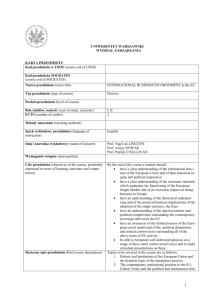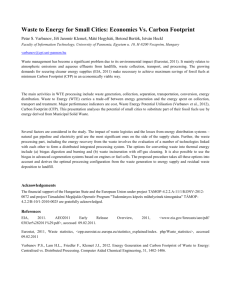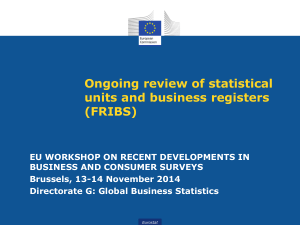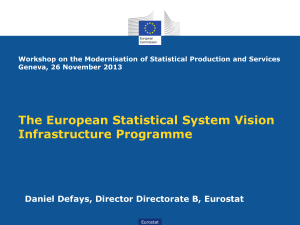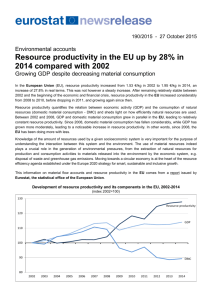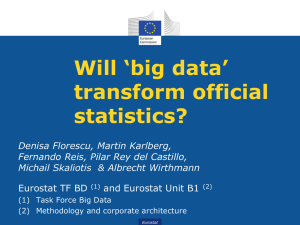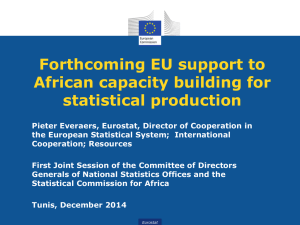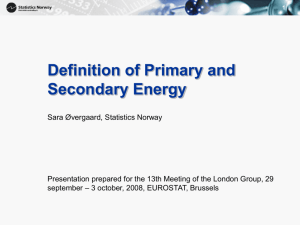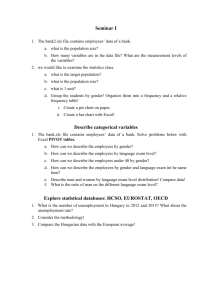Family Business Statistics - European Family Businesses
advertisement
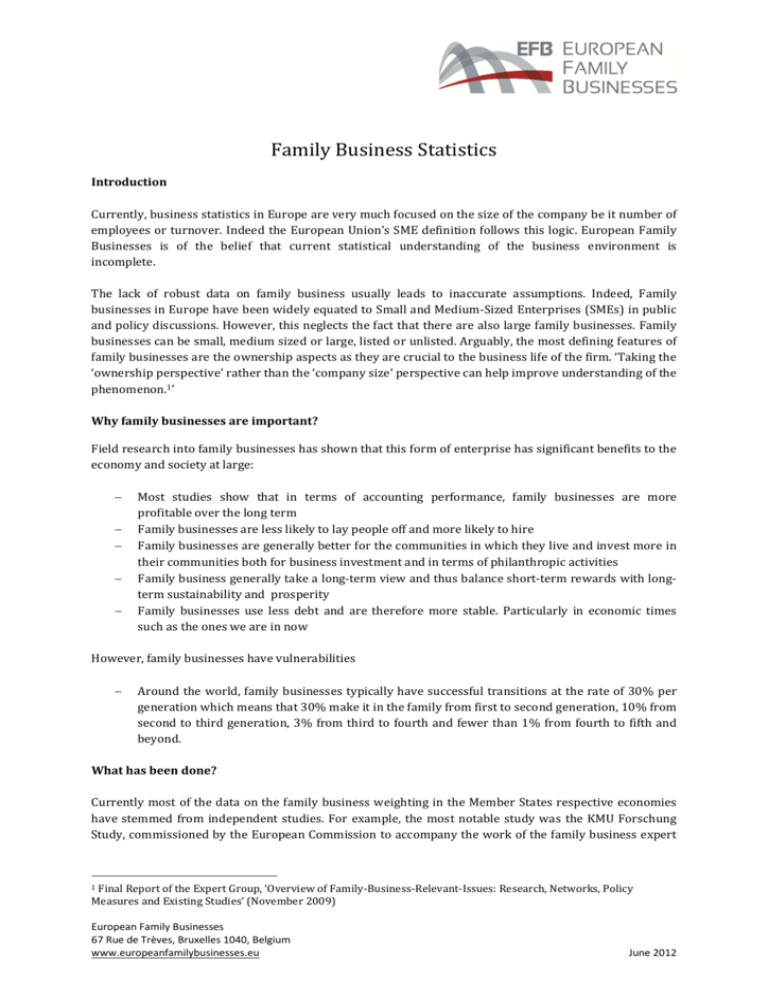
Family Business Statistics Introduction Currently, business statistics in Europe are very much focused on the size of the company be it number of employees or turnover. Indeed the European Union’s SME definition follows this logic. European Family Businesses is of the belief that current statistical understanding of the business environment is incomplete. The lack of robust data on family business usually leads to inaccurate assumptions. Indeed, Family businesses in Europe have been widely equated to Small and Medium-Sized Enterprises (SMEs) in public and policy discussions. However, this neglects the fact that there are also large family businesses. Family businesses can be small, medium sized or large, listed or unlisted. Arguably, the most defining features of family businesses are the ownership aspects as they are crucial to the business life of the firm. ‘Taking the ‘ownership perspective’ rather than the ‘company size’ perspective can help improve understanding of the phenomenon.1’ Why family businesses are important? Field research into family businesses has shown that this form of enterprise has significant benefits to the economy and society at large: − − − − − Most studies show that in terms of accounting performance, family businesses are more profitable over the long term Family businesses are less likely to lay people off and more likely to hire Family businesses are generally better for the communities in which they live and invest more in their communities both for business investment and in terms of philanthropic activities Family business generally take a long-term view and thus balance short-term rewards with longterm sustainability and prosperity Family businesses use less debt and are therefore more stable. Particularly in economic times such as the ones we are in now However, family businesses have vulnerabilities − Around the world, family businesses typically have successful transitions at the rate of 30% per generation which means that 30% make it in the family from first to second generation, 10% from second to third generation, 3% from third to fourth and fewer than 1% from fourth to fifth and beyond. What has been done? Currently most of the data on the family business weighting in the Member States respective economies have stemmed from independent studies. For example, the most notable study was the KMU Forschung Study, commissioned by the European Commission to accompany the work of the family business expert 1 Final Report of the Expert Group, ‘Overview of Family-Business-Relevant-Issues: Research, Networks, Policy Measures and Existing Studies’ (November 2009) European Family Businesses 67 Rue de Trèves, Bruxelles 1040, Belgium www.europeanfamilybusinesses.eu June 2012 group that, for the first time, performed a pan-European study on the family business sector2. Other notable studies include, the 2008 FBN Monitor3, the November 2011 Institute for Family Business study in UK4, the Nyenrode Business University study commissioned by the Dutch Ministry of Economy 20105, Study and the December 2011 Centre for European Economic Research study.6 According to the best available research, the importance of family business has been equated to: − − − − − GDP - in most countries around the world they are 60 - 90% of non-governmental GDP Jobs - in most countries around the world they are 50 – 80% of all private sector jobs Start-Ups - 85% of all business start-ups are started with family money Job growth - in the Unites States, family business represent more than 75% of net job growth Weighting - in most countries around the world, family businesses are between 70 and 95% of all business entities The first member state to make a formal official data collection on family business is Bulgaria. The Bulgarian National Statistics Institute included the Expert Group definition of Family Business in their annual statistic research for 2010. The definition is included in the annual statistic research for 2011, and the data will be available in June-August 2012. Indeed, importantly it must be noted that although the figures are very impressive, they are based on a wide variety of definitions. Reasons for Lack of Quantitative Research Although much qualitative research exists on family-owned businesses, few quantitative studies have been sought to determine their precise cumulative size and economic impact. The lack of substantial data is not surprising. Until recently few academics, governmental agencies, or data gathering enterprises, regarded families in business as characteristically distinct entities (Lansberg, Perrow & Rogolsky, 1988). Most research on family business is less than 25 years old. Another reason that more extensive quantitative research has not been accomplished, is the difficulty in defining and identifying family businesses (Handler, 1989). Given the private nature of most family businesses, accurate information about them is not readily available. But even if all pertinent information were available, a common definition of what constitutes a family business does not exist. Unlike impartial measurements that separate small businesses from Fortune 500s, such as number of employees or sales revenues, there is no standard of measurement for specifying a family business. Without a precise definition or formula for distinguishing family run businesses from their non-family counterparts, research regarding their prevalence and economic contributions is difficult.7 EU Expert Group Report: a proposal for a family business definition While no definition is perfect (no definition will capture all family businesses) a definition that works is the one that the expert group on Family Business created. Particularly for private companies, we can say 2 http://ec.europa.eu/enterprise/policies/sme/files/craft/family_business/doc/familybusiness_study_en.pdf http://www.fbn-i.org/fbn/web.nsf/doclu/AA3786AA36C250F9872575210070073E?OpenDocument 4 Institute of Family Business, The UK Family Business Sector, ‘Working to grow the UK economy’, November 2011 5 Centre for Entrepreneurship Nyenrode Business Universiteit, ‘Family Business in the Netherlands Characteristics And Success Factors’, 6 http://www.zew.de/en/press/1880/family-businesses-in-germany-create-many-new-jobs 7 Myths and Realities: Family Businesses’ Contribution to the US Economy—A Framework for Assessing Family Business Statistics. Melissa Carey Shanker and Joseph H. Astrachan. 1996 3 European Family Businesses 67 Rue de Trèves, Bruxelles 1040, Belgium www.europeanfamilybusinesses.eu June 2012 that if three or fewer families (each family having a common lineage) control more than 50% of the voting control of the company (directly or indirectly through other companies, trusts, foundations and alike), that the company is a family business. In 2007 an Expert Group on Family Business was created, bringing together experts nominated by the Member States and some experts from the field. The purpose of the group was to discuss the main problems for family firms in the single market, to identify existing family business related research, good practices in the area of family business, and family business organisations, and to give their input to the Commission on family business relevant issues. The final expert group report managed to bring the 3 accepted elements of what define a family business: A firm, of any size, is a family business, if: 1) The majority of decision-making rights is in the possession of the natural person(s) who established the firm, or in the possession of the natural person(s) who has/have acquired the share capital of the firm, or in the possession of their spouses, parents, child or children’s direct heirs. 2) The majority of decision-making rights are indirect or direct. 3) At least one representative of the family or kin is formally involved in the governance of the firm. 4) Listed companies meet the definition of family enterprise if the person who established or acquired the firm (share capital) or their families or descendants possess 25 per cent of the decision-making rights mandated by their share capital. Why family business statistics are needed? Family businesses operate differently and provide multiple other benefits to society and to have any idea of how much benefit programs and policies designed to support family business would generate, we need to know how many there are, how big they are, and the generation that they are in (program and policy priorities are different depending on generation-- for example, transfer taxes are more important in earlier generations and dividend policy more important in later generations). Indeed, some of the policies that should require special attention are: . − Transfer of Businesses − Taxation − Company Financing − Corporate Governance − Entrepreneurship education How much capital will be taken out of the business sector to pay estate taxes in the next two decades? Will the economy be adversely affected by a “estate tax bubble?” What will be the domino effect on the entire economy? Are only large family businesses hurt by estate taxes? How does estate taxes’ capital drain affect the development and perpetuation of small family businesses in the EU? If family businesses represent 90% of all EU businesses, how much in total taxes do they pay? To what extent are family businesses funding the EU? Answers to these important questions are not currently available. Clearly, there is a need for more research and study on the importance of family business for the EU economy, particularly for policy reasons. European Family Businesses 67 Rue de Trèves, Bruxelles 1040, Belgium www.europeanfamilybusinesses.eu June 2012 Proposals Proposal 1: EFB urges the EU, in the context of the European Statistical programme 2013-2017, to ensure that data on family businesses are compiled by Eurostat. The 2009 Family Business Expert Group recommends that, ‘the European Union ensures that through Eurostat robust data on family businesses and their presence and contributions to the economy and society are collected and published. Eurostat is the preferred body to collect data as it stimulates member states to gather the right data and ensure that data collection is done in similar ways. It facilitates the exchange of data, and helps identify best practices between countries.’8 Proposal 2: EFB proposes that data collected by the Eurostat should use the expert group approved definition of a family business. ‘Introducing a common EU definition of a family business and implementing it by national statistical offices (and ultimately by EUROSTAT) would facilitate better and clearer understanding. The experts recommend that the European Commission analyses the scope for promoting the definition of a family business to extend its use. This could be done, for example, by exploring with Eurostat the different possibilities of using the definition to gather information on the sector at European level. An initial step in this direction would be to use the definition in different schemes run by the European Commission (e.g. gathering definition-related information in surveys).’ 9 Conclusion In the context of Europe Economic crisis, Europe must leverage itself on its strongest assets, namely the real economy. There is unquestionable evidence that a large part of this, ‘real economy, is based on the continuation of millions of family businesses. For too long, policies have been based on narrow definitions of companies based principally on employment size and turnover. This ignores many key components of how companies are run and maintained. By not understanding these phenomena, one cannot formulate policies that are ultimately conducive to growth and prosperity. The European Statistical programme 2013-2017 is an opportunity to break the cycle of incomplete data collection. Eurostat must start compiling accurate consistent data on family businesses by utilising the EU expert group definition. It can lead to smarter statistical compilation that paints a truer picture of Europe’s real economy. 8 Final Report of the Expert Group, ‘Overview of Family-Business-Relevant-Issues: Research, Networks, Policy Measures and Existing Studies’ (November 2009) 9 Idem European Family Businesses 67 Rue de Trèves, Bruxelles 1040, Belgium www.europeanfamilybusinesses.eu June 2012
